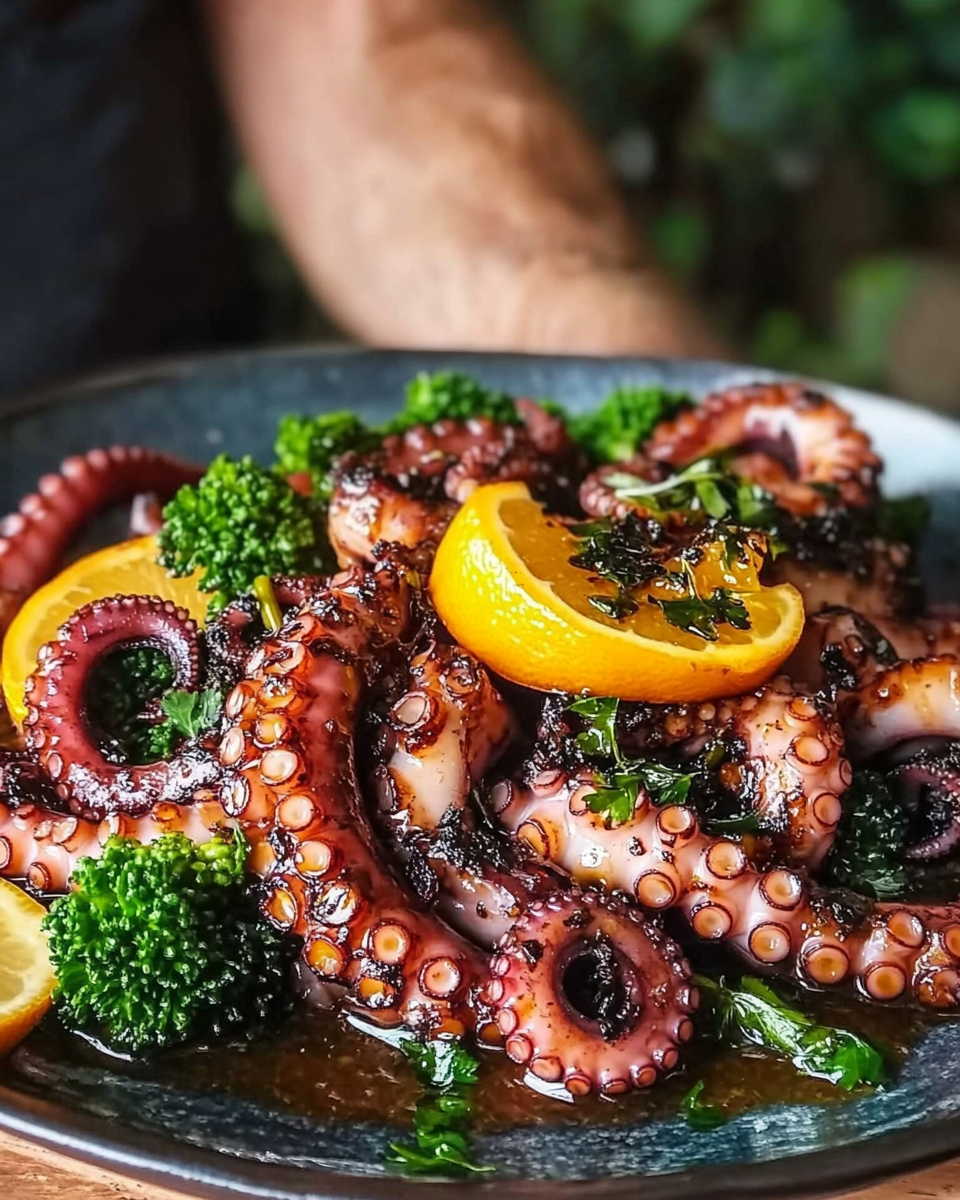This Char-Grilled Baby Octopus with Citrus Dressing recipe delivers tender, smoky octopus perfectly balanced with a bright, tangy citrus dressing. It’s a fresh, flavorful seafood dish that’s great for summer grilling or elegant appetizers. The citrus dressing enhances the natural flavors of the octopus, making every bite vibrant and delicious.
Full Recipe:
Ingredients
-
500g baby octopus, cleaned
-
2 tablespoons olive oil
-
Salt and pepper to taste
For the Citrus Dressing:
-
Juice of 1 lemon
-
Juice of 1 orange
-
2 tablespoons olive oil
-
1 garlic clove, minced
-
1 teaspoon honey or maple syrup
-
Salt and pepper to taste
-
Fresh herbs (parsley or cilantro), chopped
Directions
-
Preheat grill to medium-high heat.
-
Toss baby octopus with olive oil, salt, and pepper.
-
Grill octopus for 3-4 minutes per side until charred and tender.
-
Meanwhile, whisk together lemon juice, orange juice, olive oil, garlic, honey, salt, and pepper to make the citrus dressing.
-
Remove octopus from grill, toss with citrus dressing, and garnish with fresh herbs.
-
Serve immediately as an appetizer or light main dish.
Nutrients (estimate per serving)
-
Calories: 200 kcal
-
Protein: 30 g
-
Fat: 8 g
-
Carbohydrates: 3 g
The Appeal of Baby Octopus
Baby octopus is prized in culinary circles for its delicate texture and mild, slightly sweet flavor. Compared to larger octopus, baby octopus is tender and cooks relatively quickly, making it ideal for grilling. Its small size allows for quick charring that adds a smoky dimension without overcooking, which can result in toughness.
Nutritionally, octopus is an excellent source of lean protein, low in fat, and rich in essential vitamins and minerals such as vitamin B12, iron, and selenium. It’s a seafood choice that supports a healthy diet while providing a unique and memorable dining experience.
Grilling baby octopus is a popular method across many coastal cuisines, including Greek, Spanish, and Italian, where the focus is on simplicity and purity of flavor. This method enhances the texture and adds visual appeal with beautiful char marks.
The Role of Grilling in Flavor Development
Grilling imparts a distinctive smoky, slightly charred flavor that complements the octopus’s natural sweetness. The high heat caramelizes the exterior quickly, sealing in moisture and creating a pleasant contrast between the crisp outside and tender inside.
Char-grilling also adds a rustic and aromatic quality to the dish, evoking the sensation of outdoor cooking and fresh coastal air. The grill’s open flame lends a depth of flavor that baking or sautéing cannot replicate.
The short grilling time—only a few minutes per side—is crucial to prevent the octopus from becoming tough or rubbery, a common pitfall when cooking octopus. Proper preparation, including cleaning and possibly pre-cooking the octopus to tenderize it before grilling, ensures the best texture and flavor.
Citrus Dressing: Brightening the Dish
The citrus dressing is essential in balancing the smoky richness of the grilled octopus. Combining lemon and orange juice introduces a complex acidity that cuts through the smoky char, refreshing the palate with every bite.
The olive oil adds smoothness and richness, while the minced garlic infuses subtle pungency and depth. A touch of honey or maple syrup rounds out the acidity with a hint of sweetness, harmonizing the flavors and elevating the dressing from simple vinaigrette to something truly special.
Seasoning with salt and pepper enhances all the natural flavors and complements the octopus’s inherent brininess. Fresh herbs like parsley or cilantro provide a burst of color and an herbal freshness that lightens the dish and ties together the smoky, tangy, and sweet notes.
Nutritional Benefits of the Dish
Char-Grilled Baby Octopus with Citrus Dressing is a nutrient-dense dish that offers high protein content with relatively low calories and fat. Octopus is an excellent source of lean protein, which supports muscle maintenance and repair, while also being low in saturated fats.
The presence of citrus fruits in the dressing adds vitamin C, an antioxidant that supports immune function and skin health. Olive oil contributes heart-healthy monounsaturated fats and antioxidants, further boosting the dish’s nutritional profile.
This dish is naturally low in carbohydrates, making it suitable for low-carb and keto-friendly diets. It also fits well into gluten-free and paleo eating patterns, catering to a variety of dietary preferences and needs.
Serving Suggestions and Pairings
This grilled octopus dish is versatile in presentation and pairing. Served as an appetizer, it can be presented on a platter with additional lemon wedges, crusty bread, and perhaps a light salad of greens or tomatoes. As a light main course, it pairs beautifully with Mediterranean sides like roasted vegetables, couscous, or a simple herb and cucumber salad.
A drizzle of extra citrus dressing before serving enhances the flavor and provides a glossy finish. For a more indulgent option, adding a side of aioli or garlic mayonnaise complements the smoky and tangy profile.
To complete the meal, crisp white wines such as Sauvignon Blanc, Vermentino, or a dry rosé highlight the dish’s freshness, while sparkling water with lemon offers a refreshing non-alcoholic alternative.
Cultural and Culinary Context
Grilled octopus is a staple in many Mediterranean and Asian coastal cuisines, with slight variations in preparation and seasoning. In Greek cuisine, it’s often served simply with olive oil and lemon, highlighting its freshness. Spanish cuisine might pair it with smoky paprika and garlic, while Italian versions could include herbs like oregano and parsley.
This recipe honors those traditions with a modern, simple approach that focuses on the core elements—perfectly cooked octopus and a balanced, vibrant dressing. It is an excellent example of how minimal ingredients and simple techniques can create complex and satisfying dishes.
Tips for Perfect Grilled Octopus
The key to perfectly grilled octopus lies in tenderizing and cooking it properly before hitting the grill. While this recipe focuses on baby octopus, which tends to be tender, larger octopus may require pre-cooking by boiling or slow braising to achieve the right texture.
Patting the octopus dry before grilling helps develop a better char and prevents steaming. Using a well-oiled grill and maintaining medium-high heat ensures a crisp exterior without burning.
Marinating briefly or tossing in olive oil and seasoning before grilling enhances flavor and prevents sticking. Grilling time should be monitored closely, flipping the octopus once to get even cooking.
Allowing the octopus to rest briefly after grilling lets the juices redistribute, ensuring a moist, tender bite.
Conclusion
Char-Grilled Baby Octopus with Citrus Dressing is a beautifully balanced dish that combines the smoky, tender allure of grilled seafood with the bright, refreshing qualities of citrus and fresh herbs. This recipe is a celebration of simplicity and flavor, ideal for summer grilling or elegant appetizers that impress without overwhelming.
Rich in protein and nutrients, this dish fits well into a variety of dietary lifestyles while offering sophisticated flavors that delight the palate. Its quick preparation and minimal ingredients make it accessible to both novice and experienced cooks looking to elevate their seafood repertoire.
Adding this recipe to your website provides readers with an inspiring way to enjoy octopus, showcasing how a few quality ingredients and simple techniques can produce a vibrant, memorable meal. It’s a testament to the power of fresh, seasonal ingredients and the joy of sharing delicious food with family and friends.






